Microsoft Surface Pro 9
Microsoft's new Surface Pro 9, which the company introduced on Wednesday, presents an unusual conundrum.
Even though the company is celebrating 10 years of Surface, it didn't redesign the flagship tablet disguised as an ultra-portable laptop. At a glance, the Surface Pro 9 looks virtually the same as the Surface Pro 8. Microsoft didn't redesign the Slim Pen 2 or move it from its Type Cover cubby hole that can hug the bottom of the 120 Hz, 13-inch Pixel sense display to both hide and protect the digital pen until you're ready to use it.
Microsoft, however, did do something kind of radical. It forked the product while simultaneously making a nod to the system's Surface Pro X roots.
That product ran the SQ1 (and later SQ2), the first ARM chip to come out of Qualcomm's and Microsoft's silicon development partnership. Now, the Surface Pro 9 5G runs the latest iteration, the SQ3.
With it, the Surface Pro 9 5G is rated to operate for 19 hours on a charge. That's unheard of battery life for an ultra-light laptop, even one that doubles as a tablet. What's more, the SQ3 comes with a built-in neural processing unit (NPU) that provides AI capabilities that the Intel-based Surface Pro 9 doesn't match.
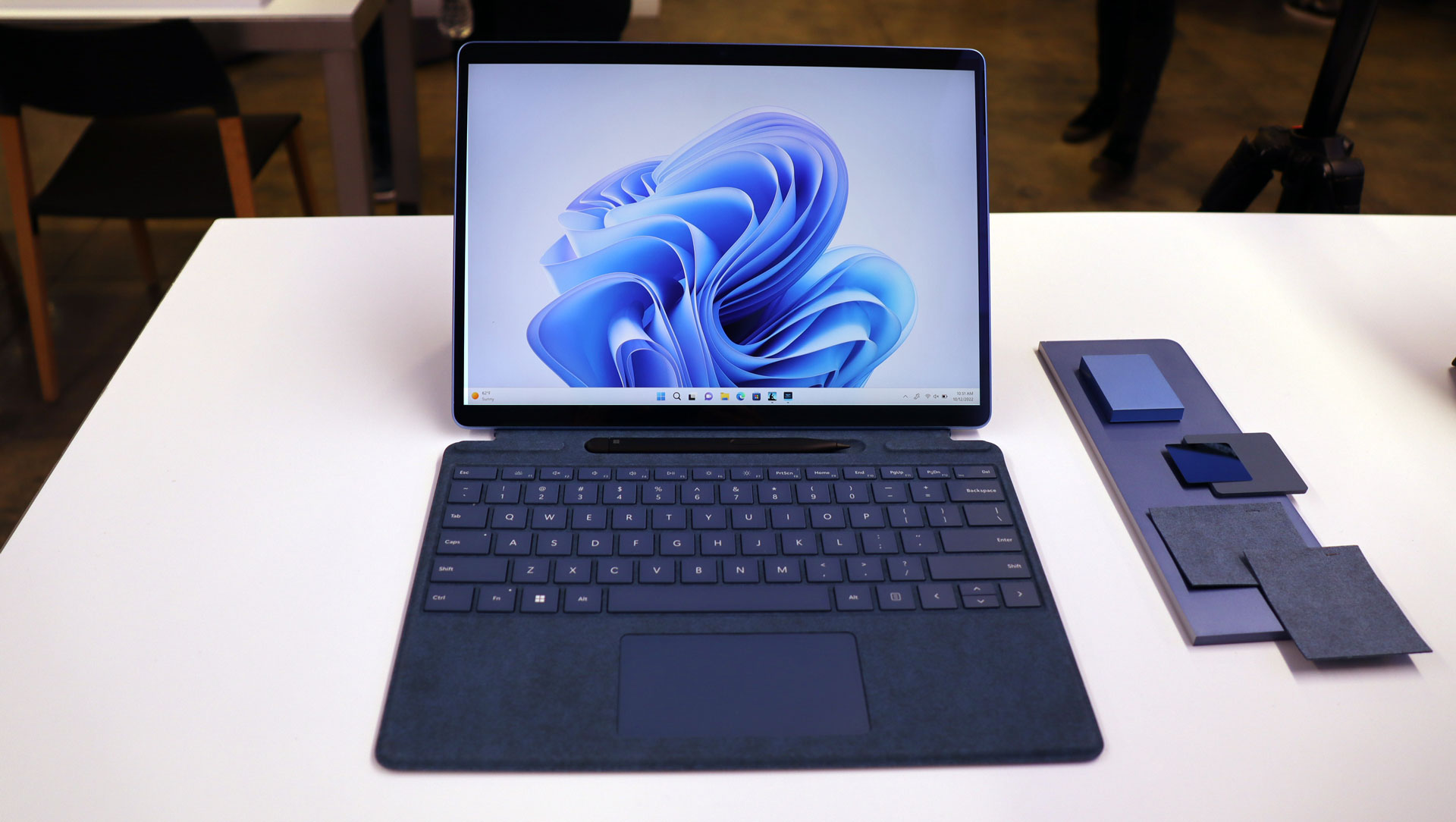
For example, the Surface Pro 9 supports the new Windows Design Studio camera enhancements including subject tracking, background blur, and Eye Contact that makes it look as if you looking at the front-facing camera even when you're not.
When we asked Microsoft if they were worried about consumers being annoyed that their powerful Windows 11, 12th Gen Intel Core i system doesn't support these features, they deflected and talked about how they offer a wealth of features across the Surface Pro 9 line.
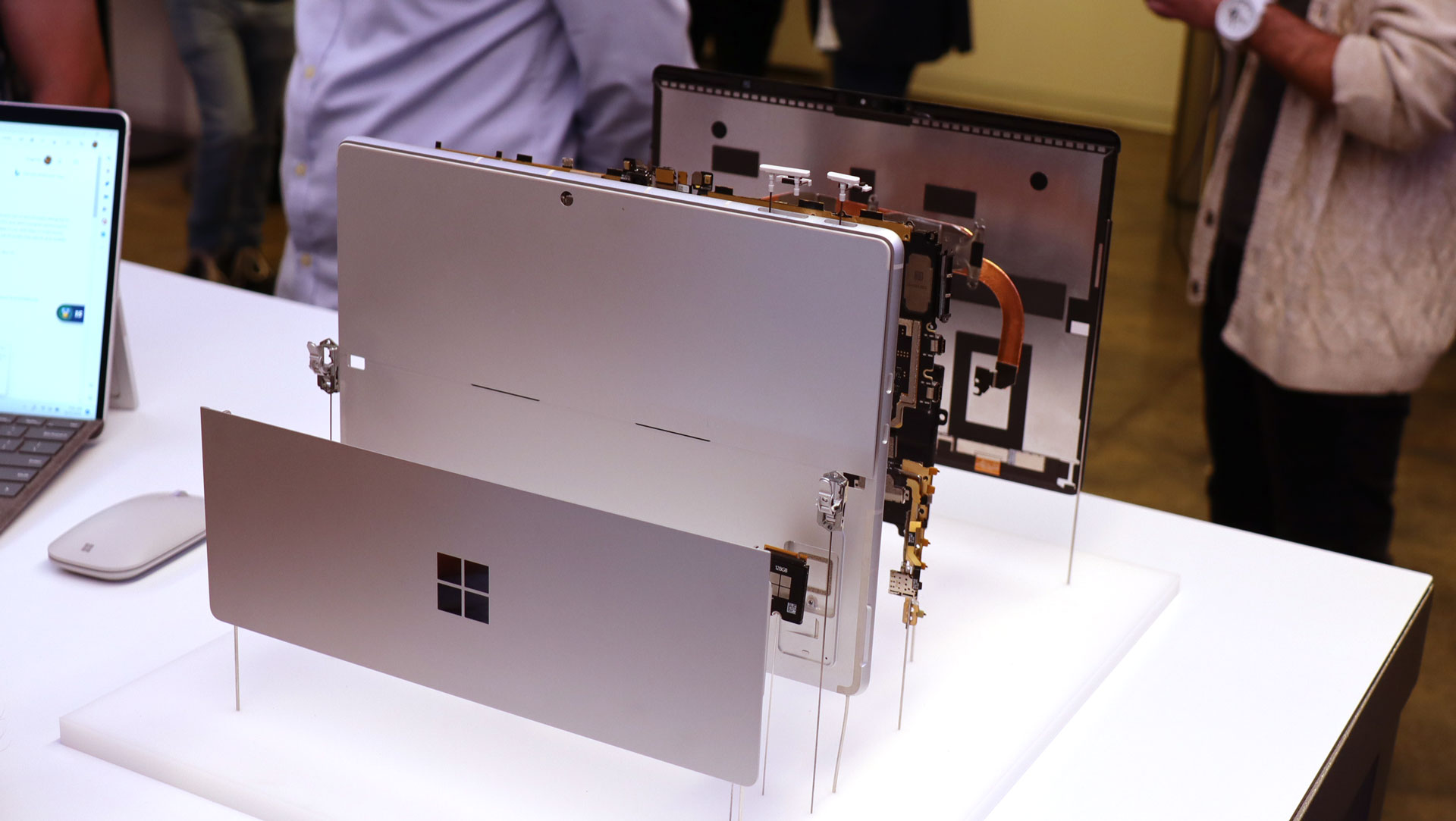
There are, by the way, some very subtle design alterations. Microsoft smoothed the edges of the Surface Pro 9 (and Pro 9 5G). It's a nice, clean look. There's a uniform ventilation channel running around the back of both devices, but only the Intel-based one has actual vent holes cut through the body to help cool down the 2.6 GHz-running Intel chip. The 5G model's channel is just that, a carved-out space that runs the circumference of the screen to attract cooler air and wick away any external heat.
Microsoft also moved the power and volume buttons from the side of the screen to the top and removed the antenna Windows. All of this serves to give the Surface Pro 9 a slightly cleaner look.
Overall, there are just enough updates to make this Surface Pro 9 more attractive than its predecessor. That there are now two models running two different CPUs to choose from may be cause for excitement or consternation. But who doesn't like options?
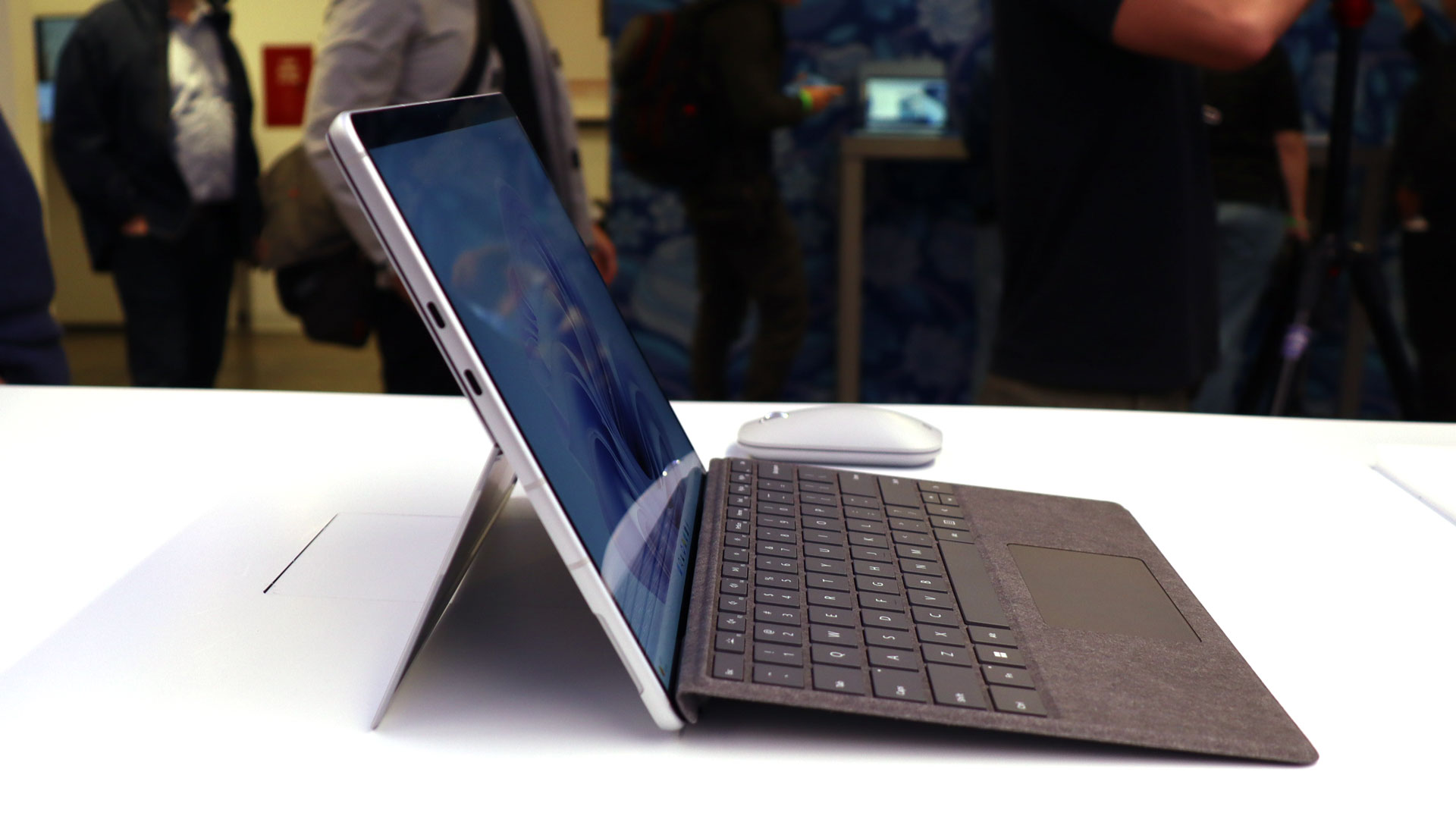
Microsoft Surface Pro 9 price and release date
Microsoft unveiled the Microsoft Surface Pro 9 and Surface Pro 9 5G on October 12 along with the Surface Studio 2 + and the Surface Laptop 5.
Pre-orders are live now. Here's the pricing breakdown. Note that none of these prices include the keyboard and Slim Pen 2. They'll add at least another $279 to the price tag:
- $999 / £1,099 / AU$1,649 12th Gen Intel Core i5, 8GB of RAM, 128 SSD
- $1,099 Intel Evo 12th Gen Core i5, 8GB of RAM, 256 GB SSD
- $1,399 Intel Evo 12th Gen Core i5, 16GB of RAM, 256 GB SSD
- $1,599 Intel Evo 12th Gen Core i7, 16GB of RAM, 256GB SSD
- $1,899 Intel Evo 12th Gen Core i7, 16GB of RAM, 512GB SSD
- $2,199 Intel Evo 12th Gen Core i7, 16GB of RAM, 1TB SSD
- $2,599 Intel Evo 12th Gen Core i7, 32GB of RAM, 1TB SSD
- $1,299 Microsoft SQ3 5G Platinum, 8GB RAM, 128GB SSD
- $1,399 Microsoft SQ3 5G Platinum, 8GB RAM, 256GB SSD
- $1,599 Microsoft SQ3 5G Platinum, 16GB RAM, 256GB SSD
- $1,899 Microsoft SQ3 5G Platinum, 16GB RAM, 512GB SSD
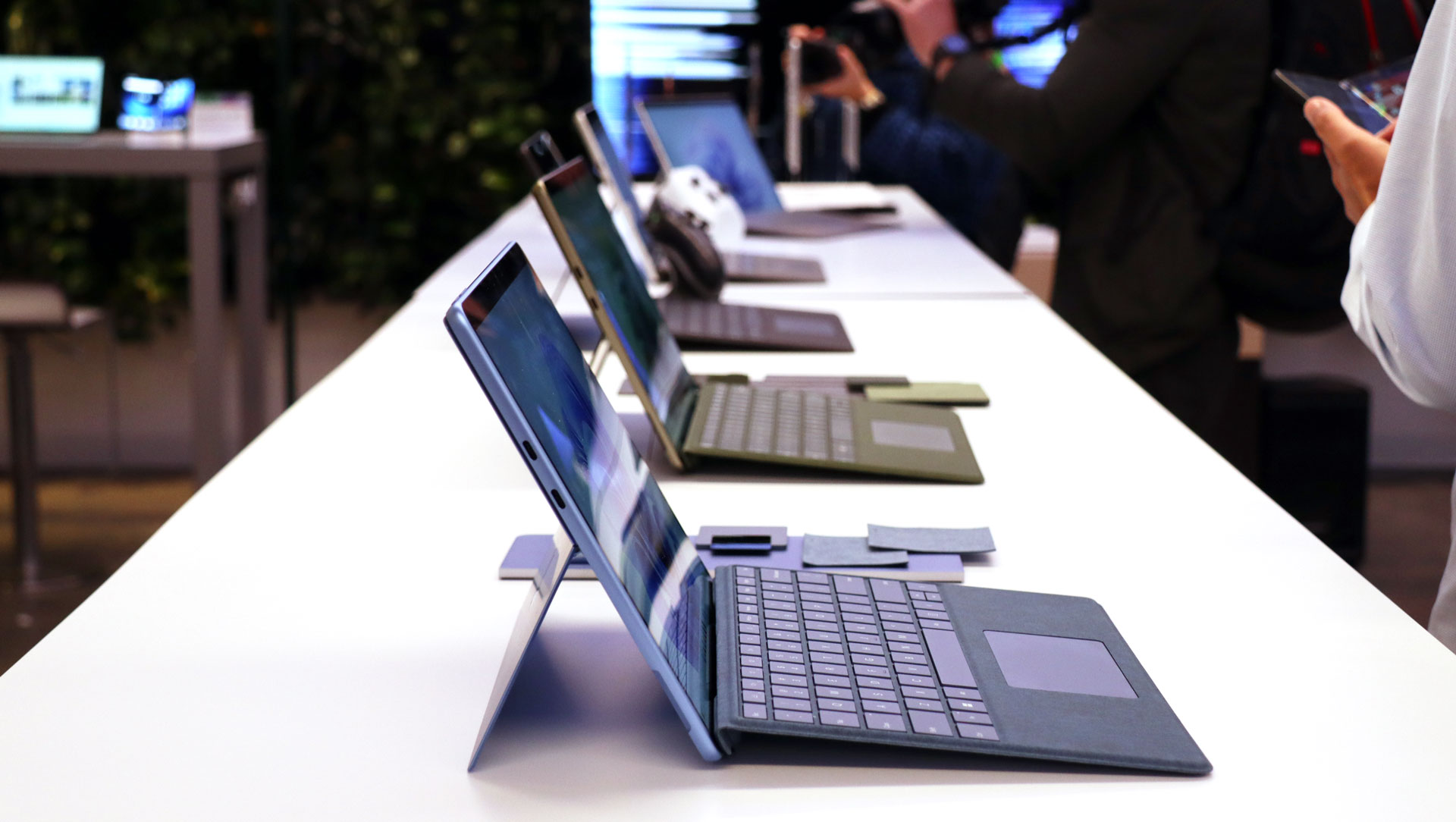
Surface Pro 9 design, materials, and display
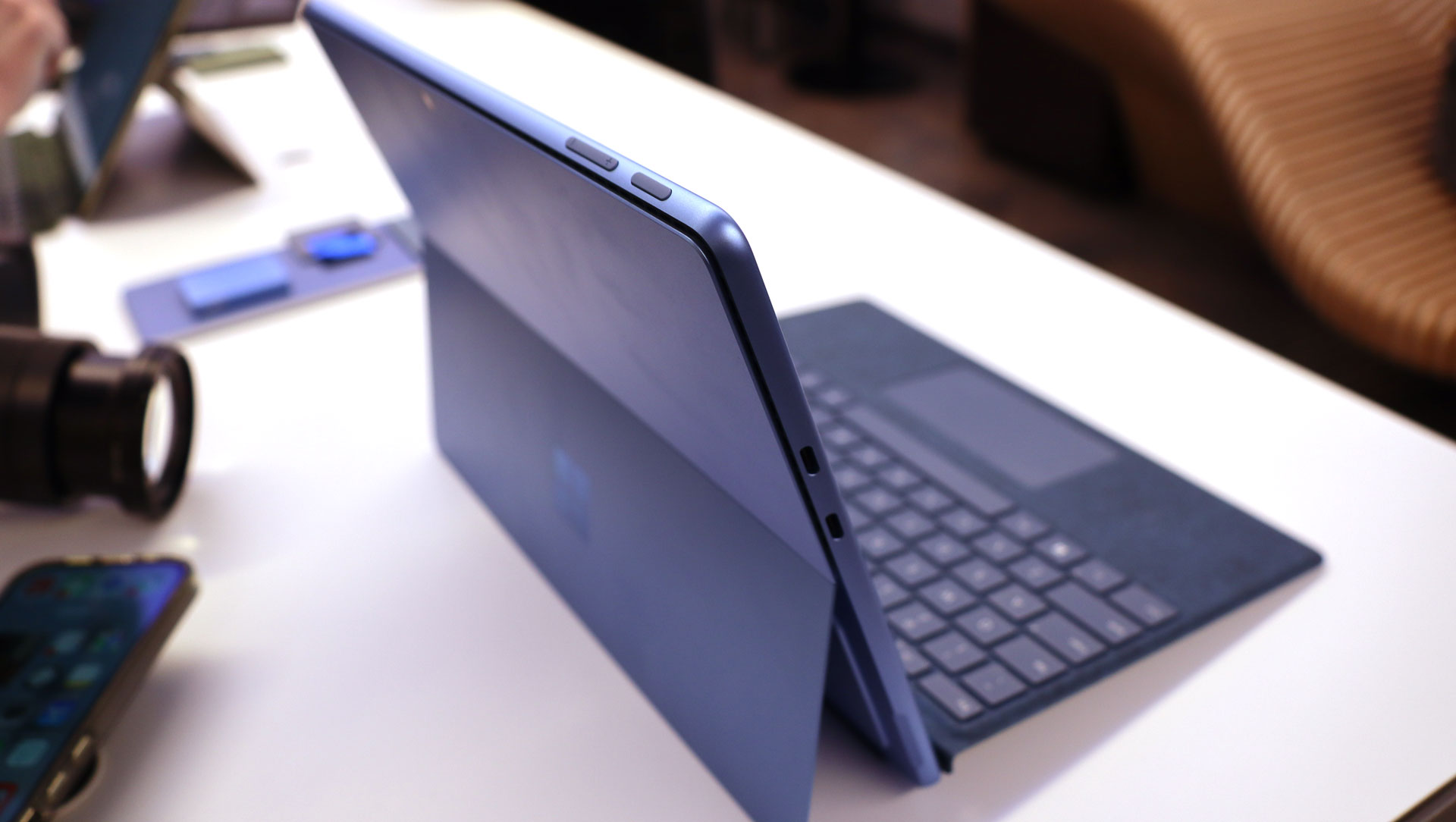
While there was nothing wrong with the look and feel of Microsoft's Surface Pro 8, the Surface Pro 9 and 9 Pro each have a cleaner and more polished look. It has curvier edges and, on the Intel-based Pro 9 version, there's no dull antenna window along the top edge.
We're glad Microsoft chose to move the power and volume back to the top edge, their original home on most Surface Pro models right up until the Pro 8.
The hidden kickstand that rotates away from the body until it's bent all the way back to the top edge of the tablet frame is unchanged. Where it once hid a micro SD slot, there's now an upgradeable SSD. The cover is easy to remove, but you would need special tools to actually replace the SSD.
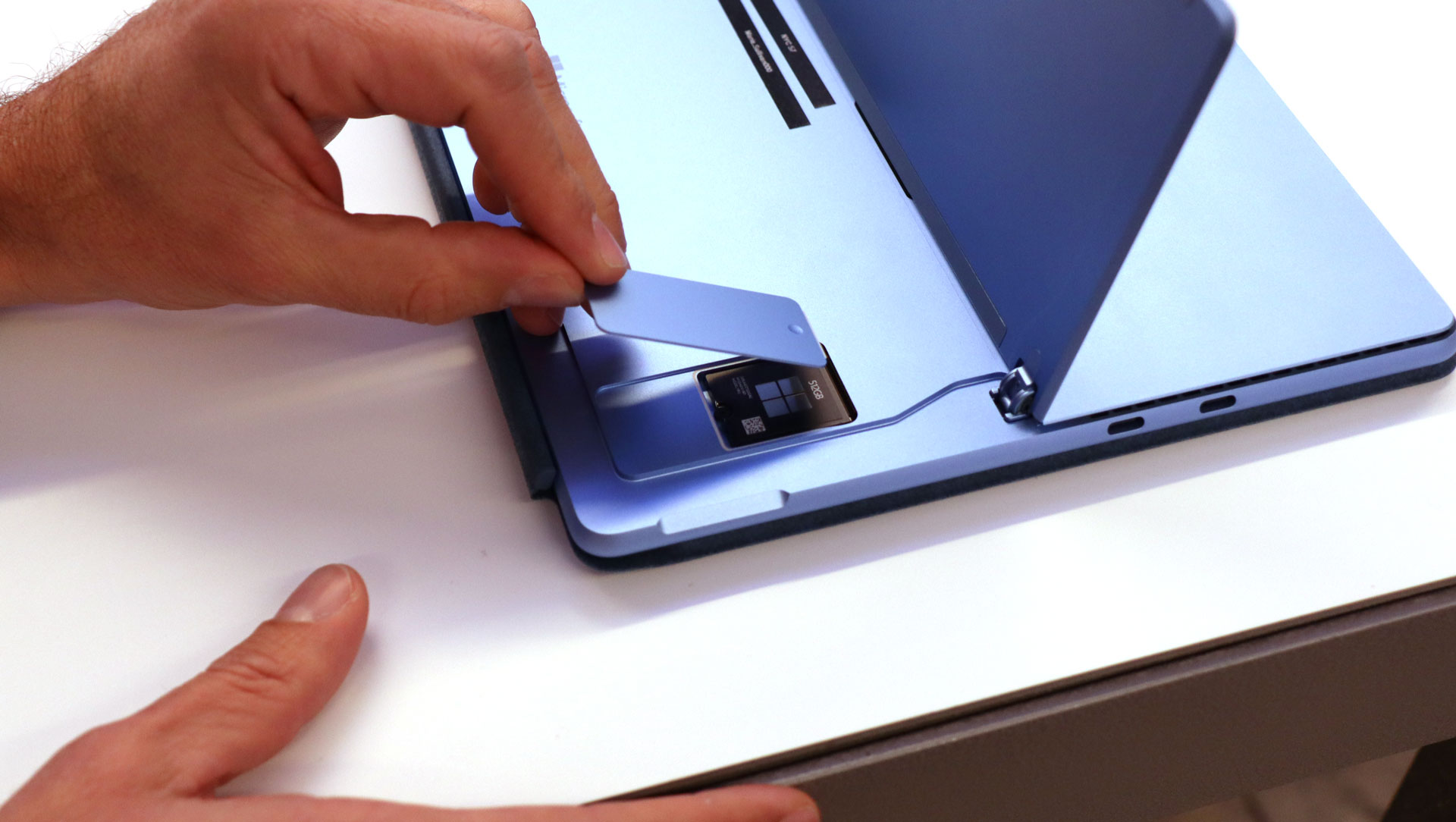
The Surface Pro 9 still features a bright and colorful, high-resolution, 13-inch Pixel Sense screen. It's a great showcase for Windows 11 and we appreciate that the side bezels are still pleasingly thin.
In the center of the deeper top bezel is the 1080p Windows Hello front-facing camera. Microsoft didn't change out the camera but did tilt it down four degrees to better accommodate how people sit when video conferencing.
At 879 grams, the Surface Pro 9 is basically unchanged from the 1.95-lb. Surface Pro 8, which is good news because one of the things we love the most about the Surface Pro line is its portability. Granted, it's more than a half-pound heavier when you add in the type cover and Slim Pen 2, but that's still a sub-3-lb portable.
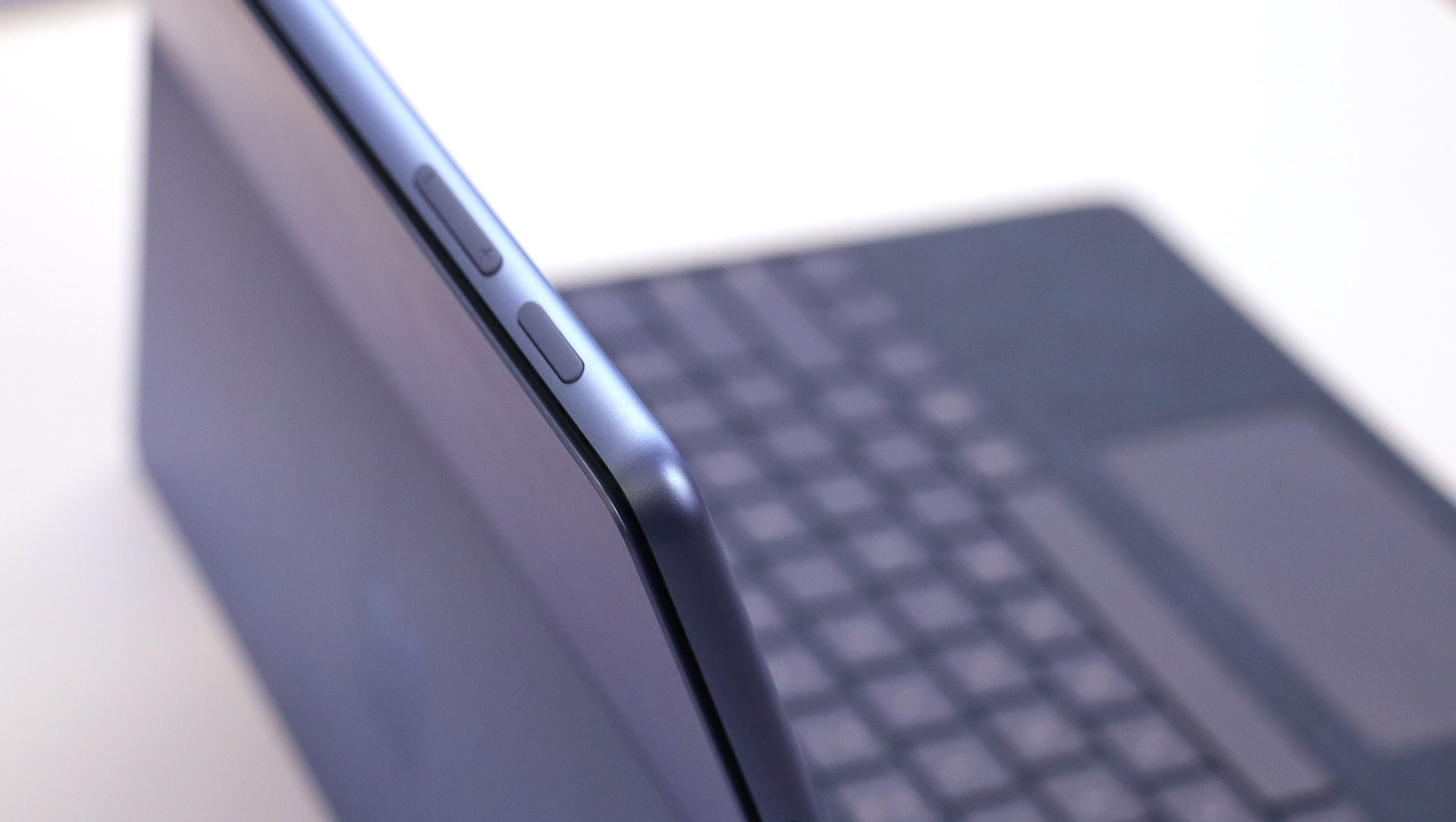
There are just two USB-C, Thunderbolt 4 ports. No USB-3, though we doubt you'll miss it. You might miss a 3.5mm headphone jack, but that's been gone for two generations. There's still a Surface Connect proprietary power port.
There are a pair of Dolby Atmos-supporting stereo speakers hidden along the edges of the screen. We didn't get to test them out, though they were quite loud on the Surface Pro 8.
There are also some well-hidden dual far-field microphones, which we have yet to try out.
Both the Surface Pro 9 and 9 Pro 5G feature a channel that runs around the outer edge of the aluminum chassis. On the former, this is a for-real, through-the-chassis vent to help keep the high-powered Intel chip cool. On the more energy-efficient Surface Pro 9 5G, the channel is only surface deep, though it's still designed to help wick away a bit of system heat.
Microsoft Surface Pro 9 keyboard and pen
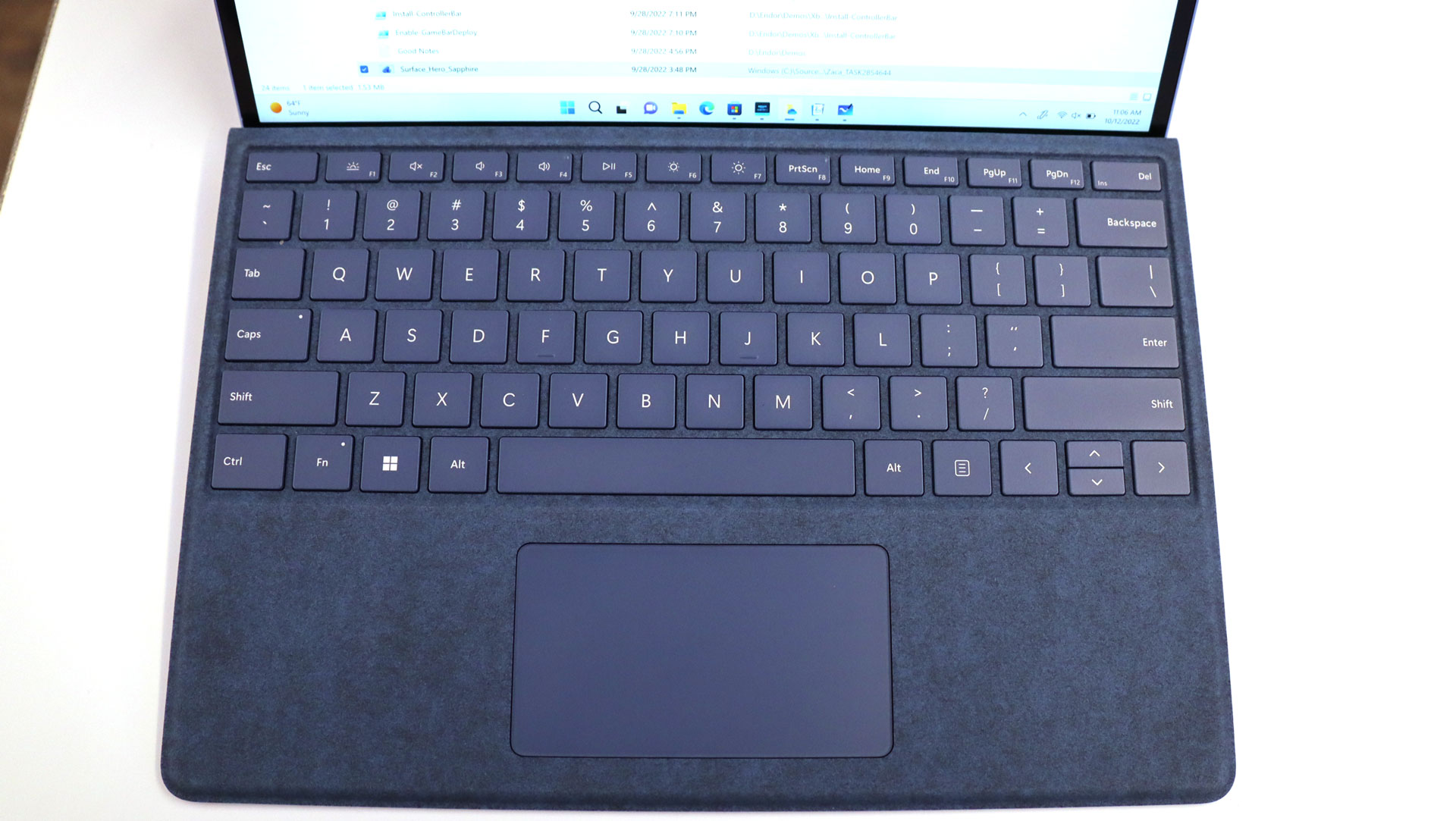
The Surface Keyboard and Slim Pen 2 do not ship with the Surface Pro 9 and Pro 9 5G, but we know of few people who use the tablet without these accessories.
The good news is the pair are unchanged from the Surface Pro 8. The Surface Pro Signature Keyboard with Slim Pen 2, as they are officially known (listing for $279) offers the same clicky 1.3mm travel, the larger, responsive trackpad, and that neat little cubby where you can safely store the pen out of sight.
We typed a bit on the keyboard and it's just as good as we remember (who are we kidding, we've been using a Surface Pro as our production system for almost a decade). The Slim Pen 2 looks unchanged, but Microsoft adjusted the haptics a bit to better mimic the feeling of drawing with a real pen or pencil on paper. We drew on both the Surface Pro 9 and Surface Pro 9 5G and must admit that the sensation of dragging on the ultra-smooth screen did make it feel like drawing on paper. We kind of loved it and were pleased to learn that the haptics are adjustable, too.
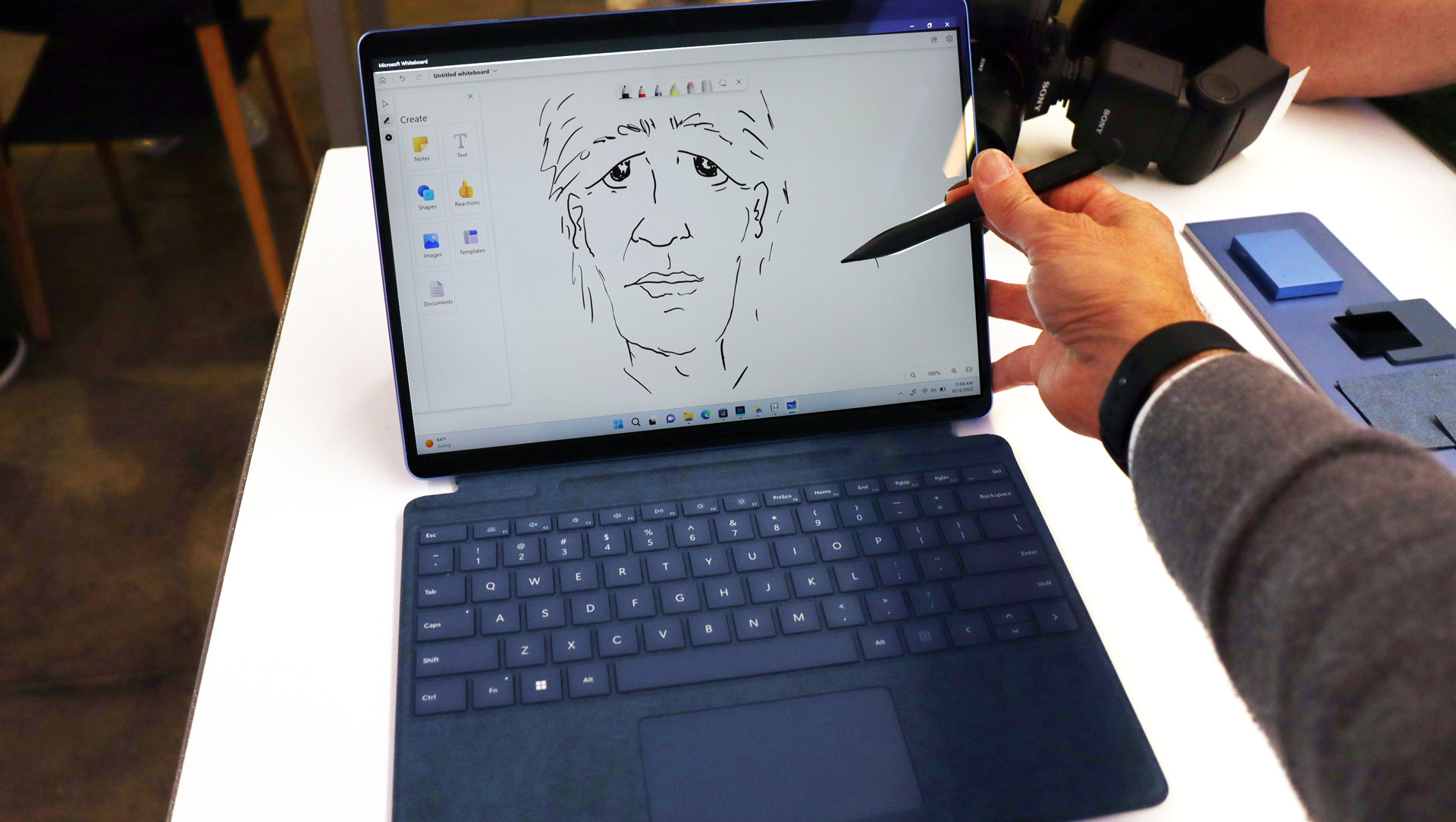
Microsoft Surface Pro 9 processor and software
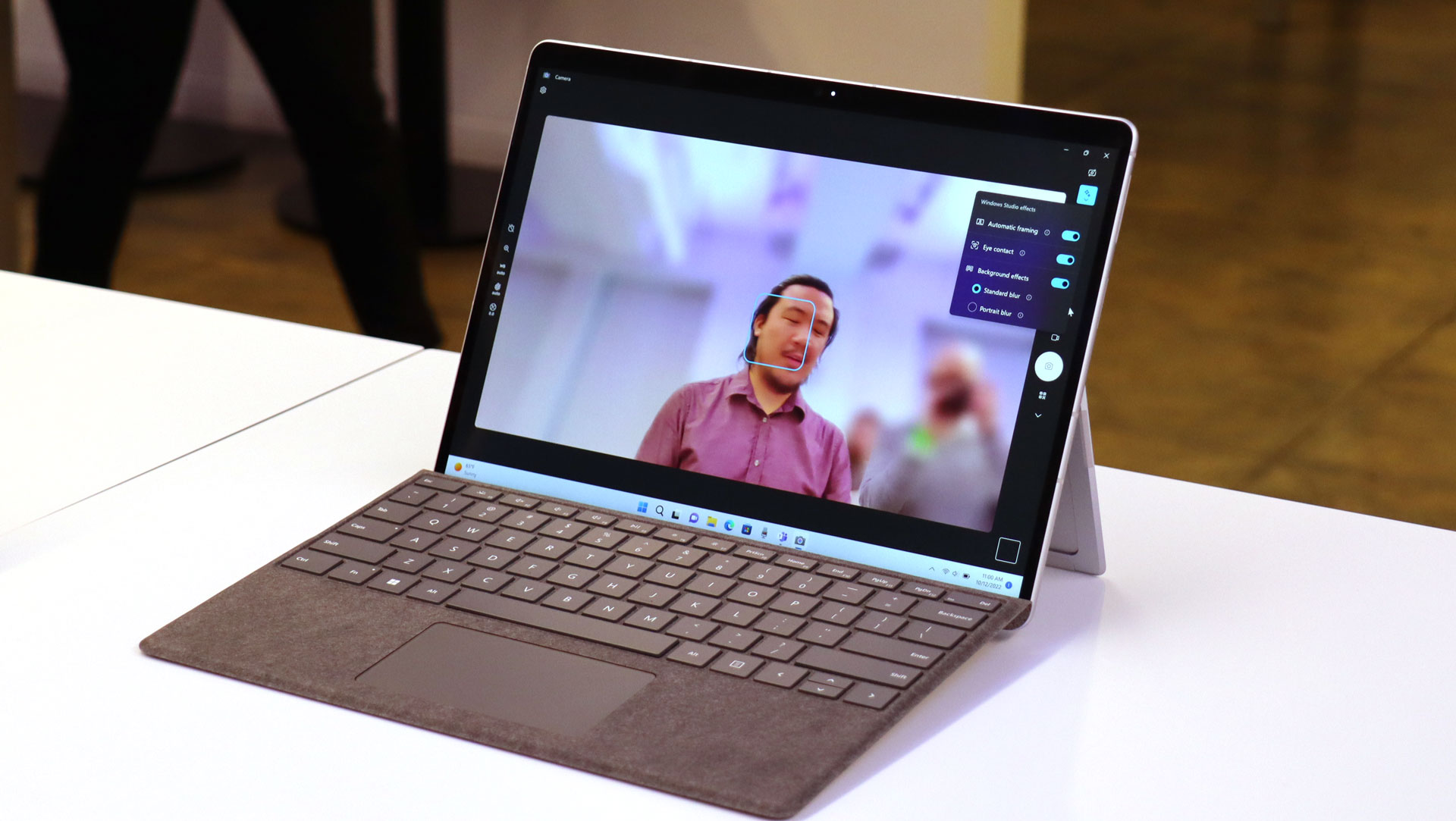
With the Surface Pro 9, you have two quite different processors to choose from: the 12th Gen Intel Core i5 (up to i7) or the Microsoft-Qualcomm-designed SQ3.
The latter is a true mobile chip with built-in 5G support. Like most mobile SoCs it's highly efficient. Microsoft promises 19 hours of battery life. The Intel model might get you just over 15 hours. Again, all of this depends on a wide variety of usage scenarios.
But there are other differences and this is where things get, well, interesting.
The SQ3 includes a neural processing unit (NPU) that allows the system to do all sorts of AI-based image tricks, including subject tracking in live video, intelligent portrait mode that can blur and unblur subjects as they move forward and back in the frame, and "Eye Contact," which makes it look as if you're staring at the camera, even when you're not. It even has powerful background noise suppression. Microsoft demonstrated all of this for us and we tried some of it, like the portrait mode/background blur tricks, on our own.
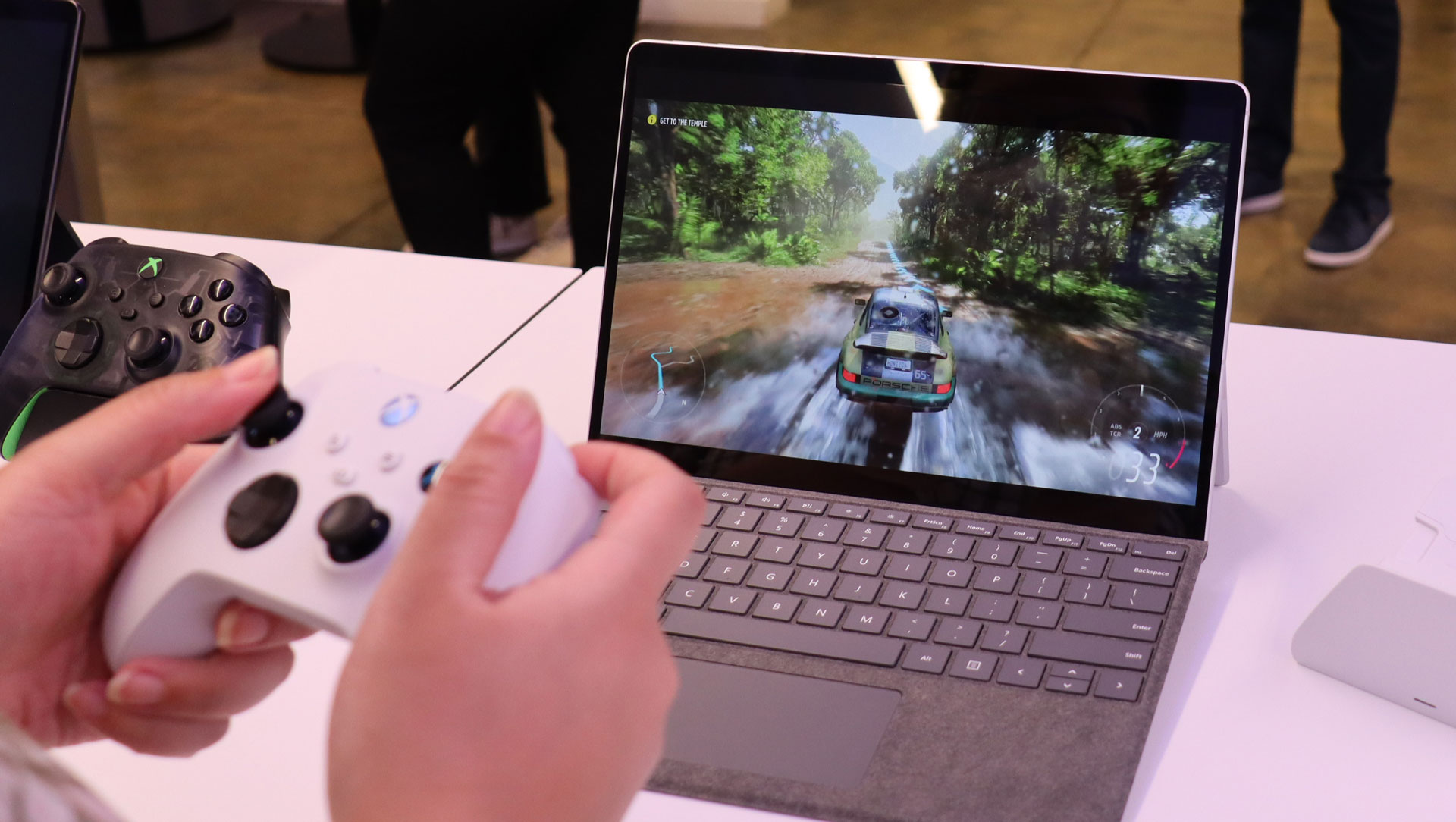
It's all pretty impressive and these are all features that the slightly less-expensive Intel-based Surface Pro 9 systems will lack. Oh, and there's that nifty, built-in 5G. Obviously not something we could test in our hands-on, but having used a 5G-ready laptop we can tell you that that level of ubiquitous connectivity is life-changing.
We can't tell you much about the performance except for the driving game Microsoft let us play on the SQ3-based Surface Pro 9. it was loud and fun (we drove using an Xbox controller). In other words, just because the chip is mobile, don't expect less-than-responsive performance.
Microsoft Surface Pro 9: Early verdict
This is both a familiar and exciting 10-year-anniversary update to the Surface Pro line. After last year's major shift to the Surface Pro X style and Slim Pen, the addition of a 5G model is a savvy enhancement that offers the possibility of full-day battery life and all those AI-based cameras and video enhancements that might make Intel Surface Pro 9 customers wonder if they made the right choice.
There is, of course, nothing wrong with the 12th Gen Intel Core i Surface Pro 9 and we suspect it will have more raw power for everyday and creative tasks. Still, the forking of the Surface Pro line feels like a calculated risk on Microsoft's part. We're duly impressed and intrigued.
- Here's everything Microsoft announced at its Surface event.
0 comments:
Post a Comment